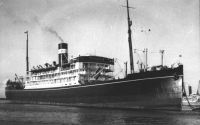

The Allen Collection*
I was seven years old when my parents decided to emigrate from England to Kenya, to start a new life, away from the rather dreary outlook in Britain at that time. My father went on ahead of my Mother, my older brother and myself, taking three days to fly into Nairobi. I think we three embarked on the MATIANA in Tilbury docks on an adventure that could have been from fantasy land. I recall that my mother had an enormous amount of luggage, including some solid oak, lead lined, ex Royal Navy wooden chests (my Grandfather was attached to the Royal Navy in the Royal William Yard in Plymouth). She had a wardrobe trunk, which opened out into hanging space for evening wear, and drawer for other accessories.
There were hat boxes and suitcases for us children. These were all brought to the cabin by the stewards, and when empty, removed to the baggage room. Dining was quite formal on the Ship and we children ate in the evenings separate to the adults, as Dinner and Dancing was a nightly feature. I can remember vividly that the cabins did not have attached bathrooms like they do today and each night your allocated "bath steward" would prepare a bath........salt water........ with fresh water for rinsing. This was at a set time, and you were in big trouble if you were late for your time slot as it upset his schedule.
As far as I can recall we called in at Gibraltar, Marseille, Genoa, when the temperature started to warm up and all the ship's crew changed from their dark uniforms into tropical whites. We then went on to Port Said into the Suez Canal, calling at Port Suez, and then on to Port Sudan.
Reaching Port Said in Egypt, we moored outside in the harbour and were taken ashore in little tender boats to the shore. Surrounding the ship and the tender boats were dozens of even smaller boats laden with people and souvenirs to sell. Very raucous bargaining would go on and many a time some goods ended up in the sea, or inconsiderate passengers or crew from the ship would take delivery of an item that was hoisted up to the ship, and would then throw money down which would end up in the sea. There were many young men swimming about trying to recover the money and goods. Ashore we were pestered by many hawkers and my mother who was an attractive red head received many a proposition. I recall a huge department store there called Simonartz... It had several levels, but not much stock, lots of gold jewellery and leather work and they were desperate to barter goods for English cigarettes that were sold so cheaply on the Ship.
I can recall that the Gully Gully Man, an Egyptian Magician, would board in Port Said and remain on board the length of the Canal, up to Port Suez, entertaining the passengers to magic shows all through the day, as well as selling various souvenirs that were spread out all over designated deck space. I remember he used to do tricks with live fluffy yellow chickens among other things.
Port Sudan was memorable because of the intense heat and the terrifying sight (to a seven year old), of the natives of Sudan, with their huge fuzzy hair styles, bodies gleaming with sweat, running up and down the gangplank, laden with huge loads of cargo which they then lowered into the holds on the ship. There was another crew of them in the hold in even more intense heat, distributing the cargo. There were no derricks on the harbour in those days.
I think we were there for two or three days and were glad to get away from the heat and the flies and the constant pestering by hawkers. I think the next Port of call was Aden, where again the heat was searing and it seemed the place to buy cheap watches ? After that we sailed on to Mombasa, where we disembarked after three weeks on the MATIANA onto the new land of Kenya Colony, which was the gateway to our life in Africa for the next 52 years. The MATIANA was scrapped in 1952.
La propiedad intelectual (c) de las fotografías y artículos expuestos, reside en el autor y el editor de la página. La reproducción total o parcial de los contenidos para fines comerciales o personales está prohibida sin la autorización expresa, en cuyo caso, se citará al autor y a Baixamar. Copyright of all photos and articles belong to the author and and the editor of this page. It is forbiden to copy either totally or partically, any of the contents of these pages without prior permission of the Author and Baixamar.
(C) Baixamar · Articulos, Noticias y Fotografias de Buques Mercantes
http://www.baixamar.com/